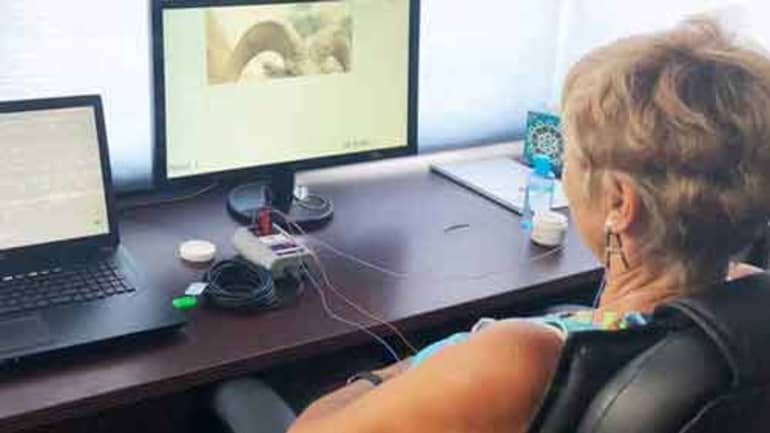Veterans of the armed forces are exposed to many different traumas throughout their time on active duty. Each of these experiences can have lasting effects on veterans’ mental health well into civilian life. Addressing the sources of trauma and its effects on veterans with post-traumatic stress disorder (PTSD) is necessary for developing a healthy and fulfilling civilian lifestyle. Neurofeedback for veterans is just one of the ways in which veterans overcoming PTSD can explore their best recovery options while facilitating a healthy civilian life.
What Is Neurofeedback for Veterans?
Neurofeedback offers a way for veterans to safely explore PTSD and its symptoms, from increased anxiety, depression, and panic to flashbacks. Utilizing the practice in conjunction with other therapies and approaches can create a holistic and comprehensive approach to healing and recovery. However, committing to neurofeedback for veterans can be difficult, especially if a veteran is uncertain of what to expect or the intentions behind it.
Neurofeedback is a technique that helps veterans visualize their own brain activity, identifying areas and stresses while helping to create a more calming and sustainable emotional state. Using a combination of sounds, visual stimuli, and continued guidance from professionals, veterans engaging in neurofeedback are empowered to learn how their bodies and minds may react under certain conditions, identify sustainable mental states, and create a healthier approach to daily healing.
PTSD can cause veterans to perceive their environments or certain stimuli differently, often through a lens of life-threatening danger depending on each veteran’s past experiences. Neurofeedback can help challenge these ideas to create a healthier emotional state with professional guidance and instant feedback on brain activity.

If you’re researching addiction treatment facilities, there might be few methods you haven’t heard of. Find answers to your questions about neurofeedback here!
More infoUnderstanding Neurofeedback in Practice
Effective engagement in any kind of therapeutic practice requires that those participating be open to its potentially transformative effects, and neurofeedback is no different. Using neurofeedback for veterans can be a transformational experience, helping veterans understand their own brains and their processes and create plans to challenge and overcome the effects of PTSD. Thus, knowing what to expect can help each individual be more receptive to the intended impact of neurofeedback for overcoming PTSD.
What to Expect
Neurofeedback for veterans begins with setting a calming atmosphere. Professionals will curate this space so that veterans can focus on the practice with minimal distractions. Next, professionals will place electrodes on key parts of the head to measure particular brainwaves. Veterans will also be seated and exposed to a number of curated stimuli, by watching something on a screen or listening to audio cues, to stimulate the brain and create a calming situation. Throughout the process, veterans will receive feedback on how their brains are reacting under certain conditions, helping them visualize and identify unhealthy emotional states and empowering them to challenge these feelings.

The average session lasts between 45 minutes and an hour. Professionals are available throughout the process to help guide or field any further questions about the continued practice for each veteran’s recovery journey. While some may not fully embrace its positive impact in the very first session, subsequent sessions can continue to familiarize veterans with its intended benefits, increasing its efficacy. Over time, veterans will gain agency over their brainwaves and a better understanding of the mental and emotional challenges on a daily basis. In summary, neurofeedback can empower veterans to be more active in addressing and challenging negative feelings and perspectives.
The Goals of Neurofeedback for Veterans
Neurofeedback has a number of unique advantages for veterans. First, being able to visualize and address the brain’s responses to stimuli can help veterans better understand how their brain reacts to particular thoughts and ideas. It can also empower veterans to better identify healthy thought patterns and emotional states compared to ones influenced by PTSD. Neurofeedback also operates by facilitating healing through addressing a veteran’s neuroplasticity, or the brain’s ability to adapt to stimuli and create new connections. This ability helps veterans create new expectations following traumatic experiences and recontextualize their experiences and thoughts, facilitating worthwhile healing from PTSD and its effects.
While neurofeedback has proven beneficial for veterans overcoming PTSD, it also has a number of other applicable situations that veterans can benefit from. Other uses for neurofeedback for veterans may include:
- Addressing anxiety
- Overcoming depression
- Increasing focus
- Promoting healthier sleep or challenging insomnia
- Addressing addiction, urges, and cravings
Neurofeedback also empowers veterans with positive feedback when certain mental states are reached, helping to normalize these healthier patterns and helping veterans better identify these calming states in daily life. All of this is done with the guidance of professionals providing their own feedback and creating a supportive environment to safely navigate challenging thoughts and emotional states while developing a new, healthy “normal.”

Neurofeedback helps rebuild broken down areas of the brain in people with PTSD, ADHD, strokes, and other neurological difficulties. Can it help cure addiction?
More infoContinuing Veteran Treatment
Veterans are tasked with unique challenges that make the transition to civilian life difficult. For some, the continued effects of traumatic experiences and PTSD can make adjusting to civilian life daunting, while others may engage in other self-destructive practices as a result of anxiety or depression, such as the use of addictive substances. Neurofeedback can help veterans overcome these challenges to better understand and adjust their mentality throughout recovery.
However, neurofeedback is not a “quick fix” to any of these challenges. Using neurofeedback in conjunction with other therapies, engagement in community healing activities for veterans, and exploration in spiritual healing through our effective Hawaii rehabilitation can create the necessary approach to an effective and transformative recovery journey.
Post-traumatic stress disorder is a ubiquitous challenge among veterans of any branch of the military, and finding the most effective and personal approach to overcoming its effects is paramount for a healthy and fulfilling civilian life. At Hawaii Island Recovery, we understand the challenges prevalent for those overcoming PTSD. Our unique approach to Hawaii rehabilitation empowers veterans to not only connect with peers and benefit from educated trauma-informed treatment, but also provides a number of therapeutic options, with neurofeedback being one of many options available for each individual to create their own most effective collection of treatment modalities. For more information on neurofeedback for veterans and its benefit to your recovery, call us today at (866) 390-5070.
 Hawaii Island Recovery
Hawaii Island Recovery 










